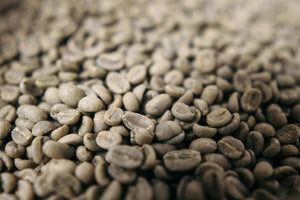There has been an awful lot of media hype around mycotoxins and whether they're likely to be found in coffee beans.
As a quick TLDR answer - NO, quality coffee doesn't contain these toxic fungi compounds!
A study published by AOAC International found that if a batch of beans had been badly processed, about 80% of any traces would be burned off during roasting and the rest during brewing.
Rest easy that all is well with your rich cup of morning coffee.
However, mycotoxins do exist in the food chain. They come from crops infected either during or after harvesting, and it's well worth understanding why we hear reports about dangerous mould spores in nuts, spices and dried grains.
Mycotoxins & Mass Food Production Explained
Unfortunately, mycotoxins are hyped up more as a marketing tool than a genuine public health effort - it's sometimes easier to promote a brand as being clean and green by implying that others aren't.
Mould is serious business and can be incredibly harmful to health, but it's not something found within the vast majority of global coffee production.
So, rewinding a bit, let's explain what mycotoxins are and how they might get into our supermarkets.
What Are Mycotoxins?
This toxin isn't actually a fungus but a by-product left behind by some types of mould.
There are several reasons it might develop in a crop:
- Lack of moisture control during storage.
- Animal products where their feed has been contaminated.
- Leaving harvests in damp conditions.
If a batch of grain, rice or dried fruit has become damp, without temperature or moisture control, it's ripe for fungus to grow - and if you eat that crop, you could suffer from a range of nasty side effects.
Those reports we mentioned earlier looked at the green, raw coffee beans, not roast beans, and these unprocessed beans can be vulnerable to mould growth if they aren't stored correctly.
The good news is that the actual coffee we drink is the bean inside the outer fruit, which needs to be washed and dried before it can be roasted.
It is improbable that even a rogue batch of poorly harvested beans would transfer mycotoxins into a cup.
How Do Coffee Growers Avoid Mould Contamination?
Hoxton Coffee is sourced and produced in small-batch, closed-loop techniques, bought directly from farmers with generations of expertise - and there's no room in their world or ours for bad coffee!
Our eco-roasts are traceable and tightly quality controlled, and it's in the grower's interest to produce exceptional flavour beans because the quality of the harvest dictates how much it's worth.
But coffee beans grow in humid, tropical climates - so what do we do to ensure there isn't any exposure to dampness or contaminants?
There are many layers to it, but careful packaging, climate-controlled shipping and full drying processes after shelling all eliminate the risk of mould.
In fact, this applies to pretty much every coffee you might pick up in a supermarket (even those bitter instants!).
What Percentage of Coffee Contains Mycotoxins?
Research published by Taylor Francis Online shows the outcome of a study in the EU looking at a range of 633 brands and coffee products - they found that:
- 75% of all products had no detectable levels of mycotoxins whatsoever.
- The other 25% contained trace elements of a minimal volume.
- Even in the worst quality coffee, you'd have to consume at least four cups every day for at least a week to reach 2% of the concentration that might begin to cause a potential health issue.
Whatever you might have read, even cheap and not-so-cheerful coffee contains zero toxins or such a minuscule amount that it doesn't cause any concern.
There we have it - coffee, especially specialist coffees produced by our best-in-class Hoxton Coffee Roasters, doesn't contain toxins and has quality baked into every drop.
From our Proper Strong to the classic House Blend, each bag of beans is harvested, roasted and packed for maximum freshness, so you get the ultimate taste sensation each time you brew a new cup - without any mycotoxins on the side.

